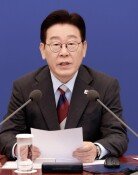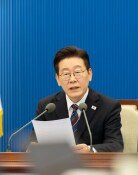[Editorial] Koreas Frustrated Police
[Editorial] Koreas Frustrated Police
Posted March. 22, 2006 03:12,
Former police chief Huh Jun-young said that it was very hard for law enforcement authorities to bring violent protesters to justice because officials at Cheong Wa Dae, who were once student activists themselves, sided with the demonstrators.
After he retired in the middle of his term after taking responsibility for the recent deaths of farmers in a street protest, he said in an interview for Shindongas April edition that when the police arrested leaders of protests against the U.S. for two middle school girls killed by U.S. soldiers, many presidential secretaries told him to set them free as early as possible (Huh was secretary for security at the time).
The attitude of presidential secretaries toward illegal violent demonstrators is shocking.
As to why the authority of law enforcement agency has stayed weak, Huh said, To say it bluntly, former student activists have considered the police to be their enemy for their entire lives. This mentality should have disappeared by now as our society has become a democratic one. But these people still stick to the old mindset, resisting law enforcement. These remarks pinpoint the core of the problem. He explained that presidential secretaries continue to deal with those who violate laws with the mindset of student activists.
Huh said, It was quite frustrating to find that the activists had direct connections to Cheong Wa Dae. He added that even when the police tried to negotiate with the protestors, they were told, We have direct connections to Cheong Wa Dae.
Through the process, the voice of activists has been amplified. His testimony shows that it is officials in Cheong Wa Dae who have patronized violent agitators who cause great inconveniences for the public by making noise, blocking streets, and often wielding deadly weapons.
Even when many riot police officers are injured by violent protesters throwing petrol bombs and stones, and brandishing iron pipes and bamboo spears, the instigators of the violence are not likely to be punished. It turns out that such weak law enforcement is the root cause of the persisting culture of violent demonstration, and student activists-turned presidential secretaries are behind the violent protestors.
Instead of empowering law enforcement authorities to create a culture of peaceful protest in society, Cheong Wa Dae sacked the police chief to please the Democratic Labor Party and activists, as well as to save the face of the president. In a nutshell, as long as the presidential officials old mindset persists, Koreas violent demonstration culture is unlikely to disappear.





![아침 공복 따뜻한 물 한 잔, 정말 살 빠지고 해독될까?[건강팩트체크]](https://dimg.donga.com/c/138/175/90/1/wps/NEWS/IMAGE/2026/03/05/133467930.3.jpg)

